|
CMA has provided municipal agencies and private companies services which include field investigations, monitoring, sampling and or extrapolating over time the movement of large scale impacted groundwater plumes or future water resource quantities for production well fields. These projects generally utilize analytical data and soil hydraulic properties collected in the field. This information is then used with water shed information to assist in groundwater modeling. Based on the project objective, modeling may be used to predict the fate and transport of a chemical constituent or the quantity of water available for the installation of a production well field.
Fate and transport modeling provides the predicted future movement of a groundwater plume. Modeling can also be performed on an aquifer to determine its water yielding capability. Information collected during the investigation aspect of a project is utilized for these objectives. As stated above, soil and groundwater hydraulic properties collected for the soil and groundwater matrices are required. During the development of a remedial strategy, this information can allow CMA to select the most cost effective remedial approach to meet our client’s budgetary and regulatory goals for the project.
Cones of depression associated with withdraw wells can also be determined through computer models or mathematical equations. CMA staff members utilize intrusive aquifer characteristics, well construction, watershed data and pump intake abilities to determine the size and shape of a cone of depression. This information can be used to determine the feasibility of a new well or well field for agricultural, commercial or municipal purposes. This information can also be used by a client when attempting to obtain a water allocation permit.
|
|
CALMAR Associates LLC. (CMA) has a staff of professionals that bring over 35 years of experience working on multiply aspects of commercial and industrial environmental projects. CMA representatives are fluent with the technical requirements pertaining to the New Jersey (NJ) Industrial Site Recovery Act (ISRA) identification. CMA has the ability to provide turnkey environmental services for their clients. Therefore, all facets of the site activities can be performed in house reducing the costs of subcontractors and allowing CMA to control time schedules required by their clients and regulatory agencies. CMA professionals have upheld working relationships with a multitude of commercial and industrial clients. Our goal is to provide our clients with the environmental services they require and serve as a liaison between them and the oversight regulatory agencies. CMA representatives pride themselves in having a profound knowledge of the environmental regulatory agencies, thus allowing CMA to formulate strategies that place their clients in the drivers seat regarding site activities.
|
|
Home |
|
About Us |
|
Services |
|
Residential |
|
Commercial |
|
Project List |
|
In The News |
|
Contact Us |
|
Commercial Services |
|
Home | About Us | Services | Residential | Commercial | Project List | In the News | Contact Us |
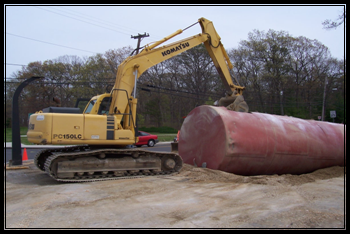
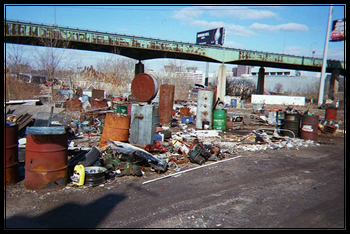
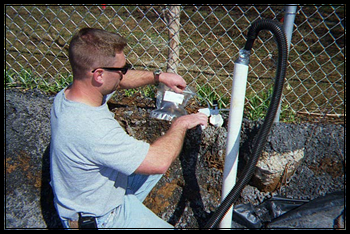
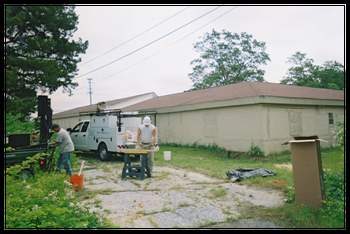


|
Environmental Site Assessments and Investigations - Property Transfer |
|
CMA’s experience in property transfers allows us to provide the property owner, buyer, or seller an informative overview of the potential environmental concerns that may exist. This information allows our clients to make informative decisions prior to and during land acquisitions or sales. Experience performing work at different types of properties and understanding the processes associated with their former uses allows CMA to formulate investigative work plans that address environmental issues that may be associated with a property. Investigative techniques are implemented that provide the requisite level of information about a site at a cost that is acceptable by our clients. Information obtained can then be utilized by the client in making important decisions pertaining to price negotiations or escrow accounts during the property transfer.
Former Manufactured Gas Plant Sites (MGP)
CMA personnel have extensive experience in all environmental aspects associated with former MGP sites. Personnel have been involved in large scale projects which have included:
· Development of Remedial Investigation Work Plans (RIWP) based on an understanding of the former site operations.
· Implementation of delineations associated with Dense Non Aqueous Phase Liquids (DNAPL) and Light Non Aqueous Phase Liquids (LNAPL) formed as a byproduct of or utilized during site operations. CMA’s staff is knowledgeable on a multitude of drilling techniques to obtain necessary environmental information while reducing the risk of cross contamination within soil and groundwater matrices.
· CMA’s staff has performed Remedial Alternative Analysis on MGP sites to address the feasibility of various in-situ, intrusive or passive technologies for soil and groundwater remediations based on the site specific data collected. This data includes delineation information collected for analytical impacts as well as soil hydraulic properties obtained from the soil and groundwater matrices. CMA’s staff also has the ability to perform large scale groundwater modeling to assist in determining future groundwater impacts based on impacted soil mass removals or natural attenuation alternatives.
· Implementation of remedial actions including In-situ alternatives which include slurry wall containment coupled with capping and natural attenuation for groundwater and or intrusive remedial excavations utilizing dewatering techniques to remove smear zone soils and assist in groundwater remediation.
|
|
Former Fuel Distribution Facilities and Large Scale Fuel Spills |
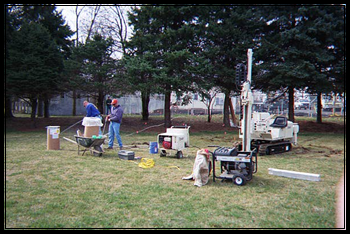
|
CMA representatives are fluent in decommissioning and removing registered Underground Storage Tanks (USTs) at commercial and industrial facilities. Staff members have removed a multitude of USTs containing various fuels. Soil and groundwater sampling protocols (depending on the state regulations) are adhered to. Tanks are always properly degassed and cleaned prior to implementing removal activities. All staff members possess the necessary state licenses and health and safety training required.
If a release is detected, CMA staff members have been involved in numerous remedial investigations and remedial actions implemented at active and inactive fuel distribution facilities. These sites include bulk fuel storage and or distribution facilities and typical fuel dispensing (gas station) operations. CMA representatives have investigated different types of fuels detected in various soil and groundwater matrices. As with MGP sites, CMA representatives possess the knowledge to formulate a turn-key environmental approach for our clients. This knowledge includes drilling methodologies, analytical sampling requirements and report preparation. CMA’s staff always follows and meets the necessary benchmarks outlined by the oversight regulatory agencies.
Based on our experience with these facilities, CMA possess the insight for designing a remedial alternative approach that best fits with our clients objectives for the facility. Remedial alternatives include a wide range of technologies which may include air sparging and soil vacuum extraction technology, oxygen coupled with ozone injection, peroxide injection, and/or remedial excavations. During many excavation projects, impacted groundwater is removed during excavation activities and is treated using sediment tanks and activated carbon vessels owned by CMA. Treated groundwater is either discharged to the sanitary sewer, storm water or re-injected based on the project in question. CMA works with state regulatory and local agencies on a daily basis in obtaining the necessary permits required to handle this treated groundwater.
All work performed at these facilities is summarized during report preparation and submitted to the appropriate regulatory agency. CMA has a working relationship with these entities and our track record assists us in facilitating the process. |
|
Groundwater Investigation and Monitoring Projects |

